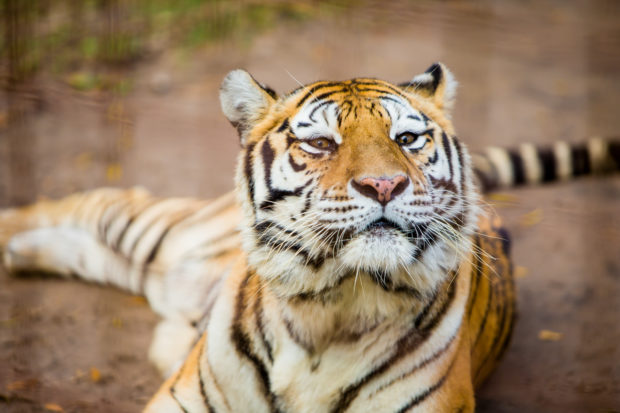This week marks the five-year anniversary of perhaps the saddest incident in the nation’s history related to the private ownership of dangerous exotic wildlife. In Zanesville, Ohio, a mentally disturbed man released his private menagerie of 50 tigers, lions, cougars, bears, wolves, and primates before committing suicide, leading authorities to hunt down dozens of the animals as dusk fell on the small community in Muskingum County. That widely reported incident triggered state lawmakers to adopt the Ohio Dangerous Wild Animal Act in 2012, a tough and highly successful law that restricts the private possession of dangerous animals.
 In Alabama, Nevada, North Carolina, South Carolina, and Wisconsin it is still perfectly legal to have a pet tiger or an African lion or a bear or a monkey. Photo by Chip Litherland/AP Images for The HSUS
In Alabama, Nevada, North Carolina, South Carolina, and Wisconsin it is still perfectly legal to have a pet tiger or an African lion or a bear or a monkey. Photo by Chip Litherland/AP Images for The HSUS
A majority of other U.S. states also restrict private ownership of powerful exotic animals, to one degree or another. But it is astonishing that there are five states — Alabama, Nevada, North Carolina, South Carolina, and Wisconsin — where it is still perfectly legal to have a pet tiger or an African lion or a bear or a monkey.
Tough and meaningful laws are necessary because, as incidents like Zanesville remind us, captive wildlife ownership can threaten public safety and animals’ lives. The large-scale release of so many dangerous wild animals in Zanesville required a massive response by multiple law enforcement agencies and other emergency responders. Residents were warned to stay in their homes, a sign on the interstate cautioned drivers to stay in their cars, and schools were closed. The animals involved paid the ultimate price, as they often do when they are brought into private ownership as pets or private menageries. One of the escaped big cats killed a baboon, and one of the other animals killed and ate a released macaque monkey.
While the details of the incident are jarring, no one should have been surprised by the terrible outcome. In Ohio, people had been mauled, maimed, and killed by bears kept as pets or in poorly run roadside zoos. Adult tigers injured 10 people, in a series of incidents, at a private menagerie that allowed close encounters with the animals. Numerous people, including children, were bitten by monkeys, and three people were killed by dangerous reptiles kept as pets. Zanesville made plain what we had been warning for years. It’s a shame it took that horrible incident to finally trigger lawmakers to act.
The Ohio Dangerous Wild Animal Act has withstood court challenges by exotic animal owners and is being meaningfully enforced by the Ohio Department of Agriculture. According to the Associated Press, it has led to a drop in the number of exotic animals and permit applications to own such animals, in the state. As many as 162 animals have been confiscated by or voluntarily surrendered to the Ohio agriculture department in the past four years.
We have countless time bombs waiting to go off in the other states with no laws:
- In Alabama, a two-year-old boy required more than 100 stitches after being clawed by a leopard at a poorly run roadside zoo, and a woman received 23 stitches for injuries to her legs and hand after she was attacked by a neighbor’s escaped pet monkey.
- In North Carolina, children have been killed and badly injured by tigers, including a 10-year-old boy who was killed when his uncle’s pet tiger reached under the fence and dragged the boy into the cage. Another pet tiger mauled, critically injured, and left a three-year-old boy permanently blind while his father was walking the animal on a leash.
- In Nevada, in addition to chimpanzees running amok in Las Vegas, there have been numerous dangerous incidents such as the man who required more than $160,000 in medical care after being bitten by a pet tiger who belonged to an acquaintance, and the handler who bled to death after being bitten on the throat by a tiger at a roadside zoo.
- In South Carolina, a 250-pound lion escaped from a backyard enclosure, burst into a mobile home, and attacked a five-year-old girl and her grandmother. A woman was hospitalized with severe injuries after she was attacked by a relative’s pet black bear, and two shelter workers were bitten by a Rhesus macaque who was discovered running loose in a resident’s yard.
- In Wisconsin, an eight-year-old girl had to be given rabies shots after she was bitten by an 80-pound lion cub exhibited at a pet store; seven people have been bitten by primates kept as pets or in roadside zoos; and there have been at least five instances of people, including a teenager, hospitalized after they were bitten by venomous snakes kept as pets.
Will it take another incident on the scale of Zanesville in one of their own states to compel these lawmakers to act? There are tough calls that politicians have to make, but this is not one of them. It’s shameful that lawmakers haven’t adopted policies to prohibit this conduct, and it’s about time they get on board. The five-year anniversary of Zanesville provides all the reminder they need.
The post In wake of Zanesville tragedy, five states still have no rules on private ownership of dangerous animals appeared first on A Humane Nation.
Enviroshop is maintained by dedicated NetSys Interactive Inc. owners & employees who generously contribute their time to maintenance & editing, web design, custom programming, & website hosting for Enviroshop.
